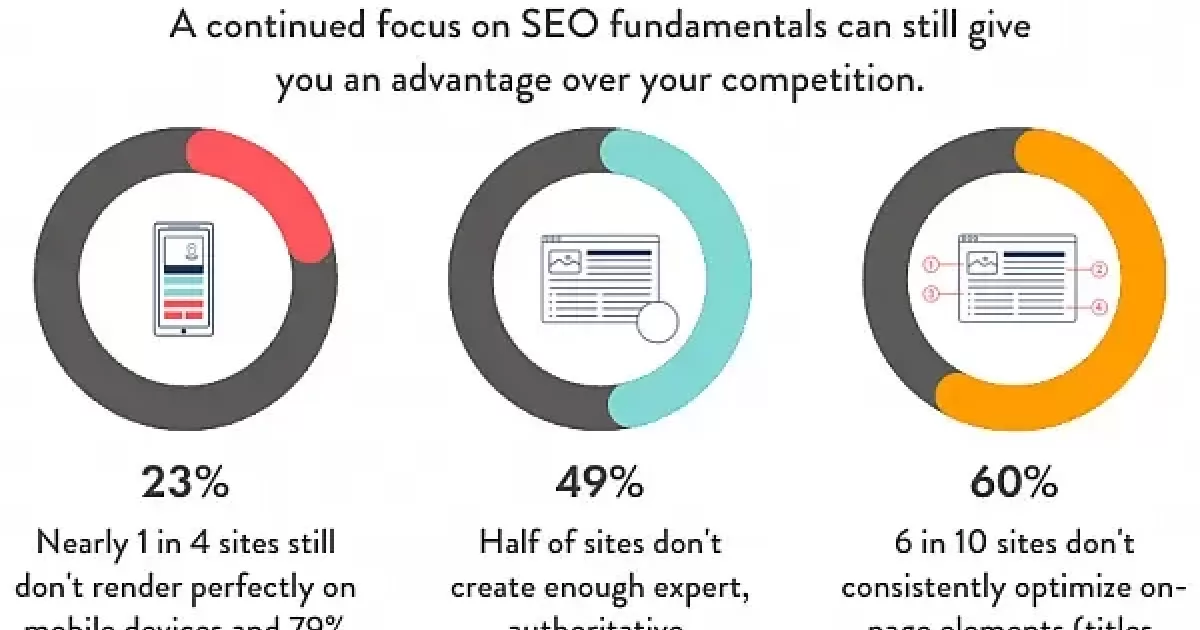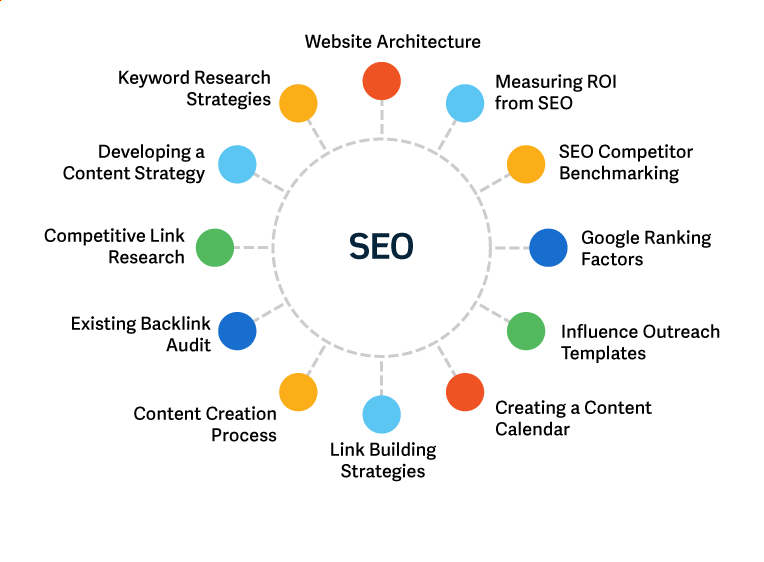Uncover the secrets of SEO’s beginnings with a deep dive into historical insights that shaped the foundations of optimization.

Image courtesy of via DALL-E 3
Table of Contents
Introduction to SEO
SEO, which stands for Search Engine Optimization, is like a secret code that helps websites become more visible on search engines like Google. Imagine you have a favorite book, but you can’t find it in the library because it’s hidden among so many other books. SEO is like the magic spell that makes your favorite book (or website) easier to find!
When someone searches for something on Google, they type in words related to what they want. SEO helps websites use those words, called keywords, in a smart way so that Google can find them easily. Think of it as Google’s way of playing hide-and-seek with websites, and SEO is the strategy to be found quickly!
Without SEO, websites might be like hidden treasures that no one gets to see. So, understanding and using SEO can help websites appear higher in search results, making them more popular and visited by people around the world.
The Early Days of SEO
SEO, or search engine optimization, is crucial for websites to rank well on search engines like Google. But have you ever wondered how SEO started? Let’s take a trip back in time to explore the early days of SEO and how it all began.
The First Search Engines
In the early days of the internet, search engines were just starting to emerge. Websites relied on these search engines to drive traffic to their pages. The first search engines, like Archie, Veronica, and Excite, were primitive compared to today’s Google. People would submit their websites to these engines and hope to get noticed amidst the growing web.
Basic SEO Techniques
Website owners quickly realized the importance of appearing on the first page of search results. To achieve this, they employed basic SEO techniques like keyword stuffing, meta tags, and link exchanges. These methods helped websites climb the ranks and become more visible to users searching for specific information.
How SEO Changed Over Time
SEO, or search engine optimization, has transformed significantly over the years due to algorithm updates by search engines like Google. Algorithms are like sets of rules that search engines use to determine which websites to show in search results. With every update, these rules change, affecting how websites are ranked.

Image courtesy of www.workshopdigital.com via Google Images
The Rise of Content Quality
In the early days of SEO, websites primarily focused on using keywords to attract search engine attention. However, as search engines evolved, they began to prioritize quality content over keyword stuffing. This shift meant that websites had to provide valuable and relevant information to users to rank higher in search results.
Key Components of Modern SEO
In modern SEO, keywords play a crucial role in helping search engines understand the content of a website. Keywords are specific words or phrases that people use when searching for information online. By incorporating relevant keywords into your website content, you can improve its chances of ranking higher in search engine results.
Backlinks
Backlinks are links from other websites that point to your site. Search engines view backlinks as a vote of confidence in your content, which can help improve your website’s authority and credibility. Building a strong network of backlinks from reputable sites is essential for boosting your site’s visibility in search results.
User Experience
User experience (UX) refers to how visitors interact with your website and the overall satisfaction they derive from it. Search engines like Google prioritize websites that offer a positive user experience, such as fast loading times, easy navigation, and mobile responsiveness. By focusing on improving your site’s UX, you can enhance its SEO performance and attract more visitors.
On-Page vs. Off-Page SEO
On-Page SEO refers to the factors that you can control directly on your website to improve its search engine visibility. It includes optimizing your website content, improving HTML elements, and ensuring a user-friendly experience.

Image courtesy of www.actualtechmedia.com via Google Images
One key aspect of On-Page SEO is content optimization. This means creating high-quality, relevant content that is valuable to your audience and includes relevant keywords that people are searching for. By having well-written and informative content, you can attract more visitors to your website.
Another important element of On-Page SEO is making improvements to the HTML aspects of your website. This includes optimizing meta tags, headings, and images to make it easier for search engines to understand the context of your pages. By ensuring that these elements are well-optimized, you can improve your website’s chances of ranking higher in search engine results.
Off-Page SEO
Off-Page SEO, on the other hand, involves activities that take place outside of your website to improve its visibility and reputation. One of the main elements of Off-Page SEO is link building. This involves getting other reputable websites to link back to your site, which signals to search engines that your content is valuable and trustworthy.
Social media promotion is also a crucial part of Off-Page SEO. By sharing your content on social media platforms and engaging with your audience, you can increase your website’s visibility and attract more visitors. Social signals, such as likes, shares, and comments, can also impact your website’s search engine rankings.
Understanding the differences between On-Page and Off-Page SEO is essential for creating a well-rounded SEO strategy that can help your website rank higher in search engine results. By focusing on both aspects and implementing best practices, you can improve your website’s visibility and attract more organic traffic.
Common SEO Mistakes
One common mistake that people make when trying to improve their website’s visibility is overusing keywords. Keywords are important for SEO because they help search engines understand what your content is about. However, using too many keywords in your content can actually have a negative impact. When you stuff your content with keywords, it can make your content look unnatural and spammy to both search engines and readers. This can hurt your website’s credibility and could even result in a penalty from search engines.
Black Hat Techniques
Another SEO mistake to avoid is using black hat techniques. Black hat SEO refers to unethical practices that some people use to try and manipulate search engine rankings. These tactics can include things like keyword stuffing, cloaking content, or buying backlinks. While these practices may lead to short-term gains in ranking, they almost always result in long-term consequences. Search engines are constantly updating their algorithms to penalize websites that engage in black hat SEO, so it’s important to focus on ethical and sustainable SEO strategies.
Future of SEO
Voice search is a new way for people to find information on the internet by speaking rather than typing. Instead of typing a question into a search engine, you can simply ask your device a question out loud. This technology is becoming more popular as smart speakers like Amazon’s Alexa and Google Home are being used in homes. For SEO, this means that websites will need to optimize their content so that it can be easily found through voice search inquiries. This involves creating conversational content that matches the way people speak.

Image courtesy of www.oviond.com via Google Images
AI and Machine Learning
AI (Artificial Intelligence) and machine learning are technologies that allow computers to learn and adapt based on data without being explicitly programmed. In the context of SEO, these technologies are being used to improve search engine algorithms and provide better search results to users. AI can analyze user patterns, preferences, and behaviors to provide more relevant search results. For example, AI can help search engines understand search intent better, leading to more accurate and personalized results. As AI continues to advance, it will play a significant role in shaping the future of SEO.
Conclusion
Throughout this blog post, we’ve journeyed through the foundations of SEO, uncovering its historical evolution and key components that shape the digital landscape today. Understanding the origins of SEO is crucial in grasping how websites strive to rank higher on search engines like Google.
From the early days of basic website optimization to the ever-changing landscape of algorithm updates, SEO has seen a significant transformation over time. The emphasis on content quality, user experience, keywords, and backlinks has become paramount in modern SEO strategies.
It is essential for website owners and digital marketers to grasp the distinction between on-page and off-page SEO, ensuring a well-rounded approach to optimizing their online presence. Avoiding common pitfalls like overusing keywords and resorting to black hat techniques is vital to maintaining a sustainable and ethical SEO strategy.
Looking towards the future, emerging trends such as voice search and the integration of AI and machine learning signal a dynamic shift in how SEO will continue to adapt and evolve. Staying ahead of these trends will be key in staying competitive in the digital sphere.
By delving into the history and understanding the current trends in SEO, individuals and businesses alike can position themselves for success in the ever-evolving world of online visibility and website ranking.
Want to turn these SEO insights into real results? Seorocket is an all-in-one AI SEO solution that uses the power of AI to analyze your competition and craft high-ranking content.
Seorocket offers a suite of powerful tools, including a Keyword Researcher to find the most profitable keywords, an AI Writer to generate unique and Google-friendly content, and an Automatic Publisher to schedule and publish your content directly to your website. Plus, you’ll get real-time performance tracking so you can see exactly what’s working and make adjustments as needed.
Stop just reading about SEO – take action with Seorocket and skyrocket your search rankings today. Sign up for a free trial and see the difference Seorocket can make for your website!
Frequently Asked Questions (FAQs)
What is SEO?
SEO stands for search engine optimization. It is a way of making your website more visible on search engines like Google. By using SEO techniques, you can improve your website’s rank and make it easier for people to find when they search for related topics online.
Why is SEO important?
SEO is important because it helps your website get noticed on the internet. When your website ranks higher on search engine results pages, more people are likely to visit it. This increased traffic can lead to more visibility, higher engagement, and potentially more customers or readers for your site.
How can I improve my website’s SEO?
To improve your website’s SEO, you can start by using relevant keywords that match what people are searching for online. Creating high-quality content that is easy to read and interesting for your audience is also essential. Additionally, building backlinks from reputable websites and ensuring a smooth user experience on your site can further boost your SEO efforts.







